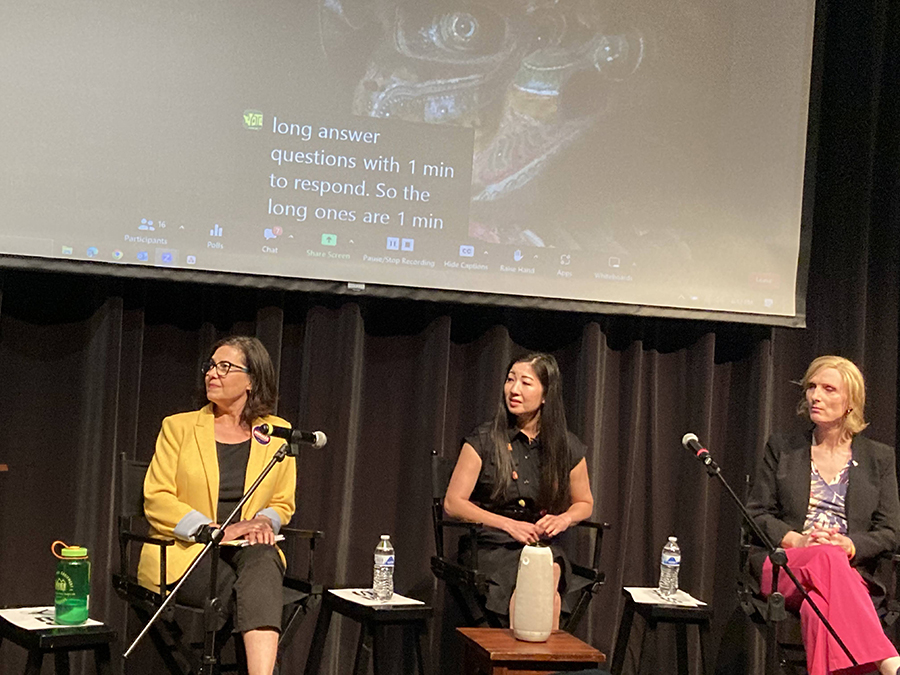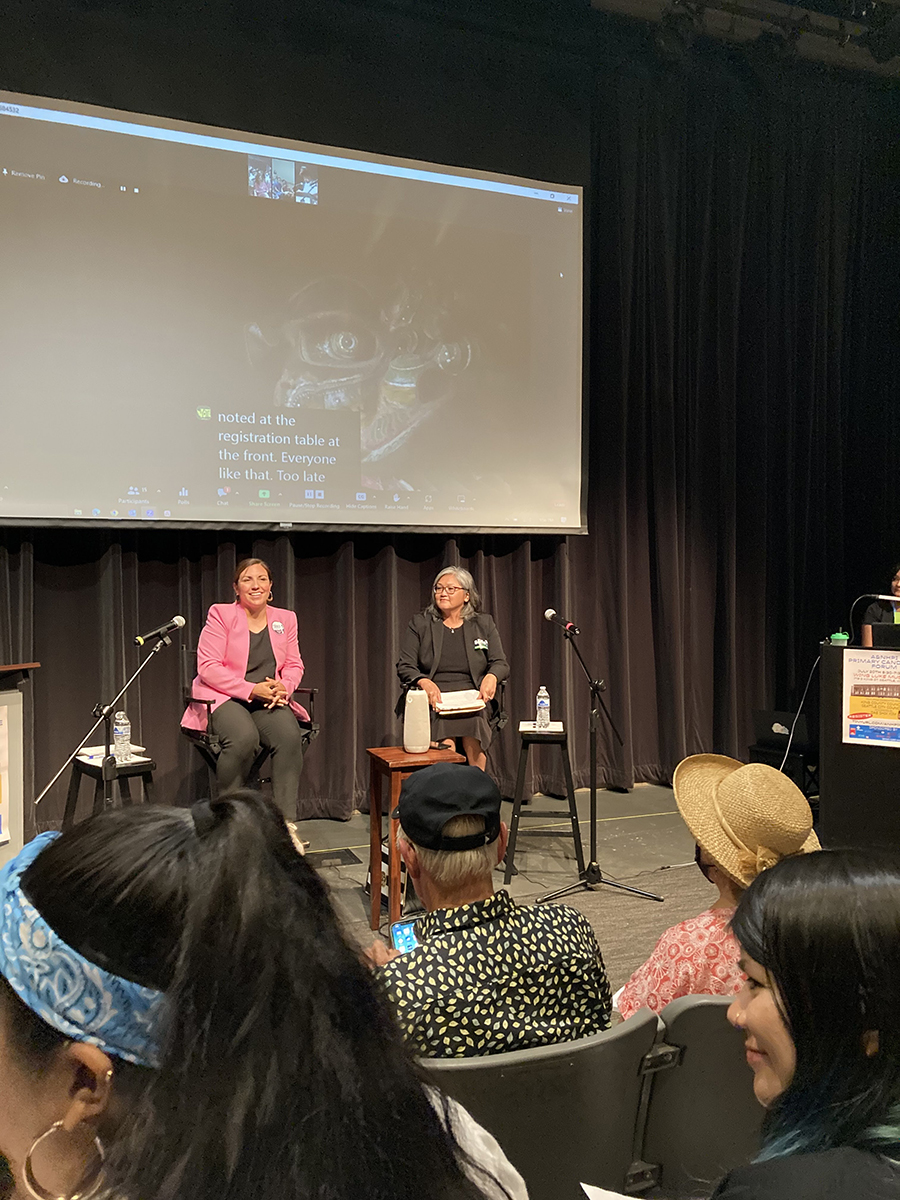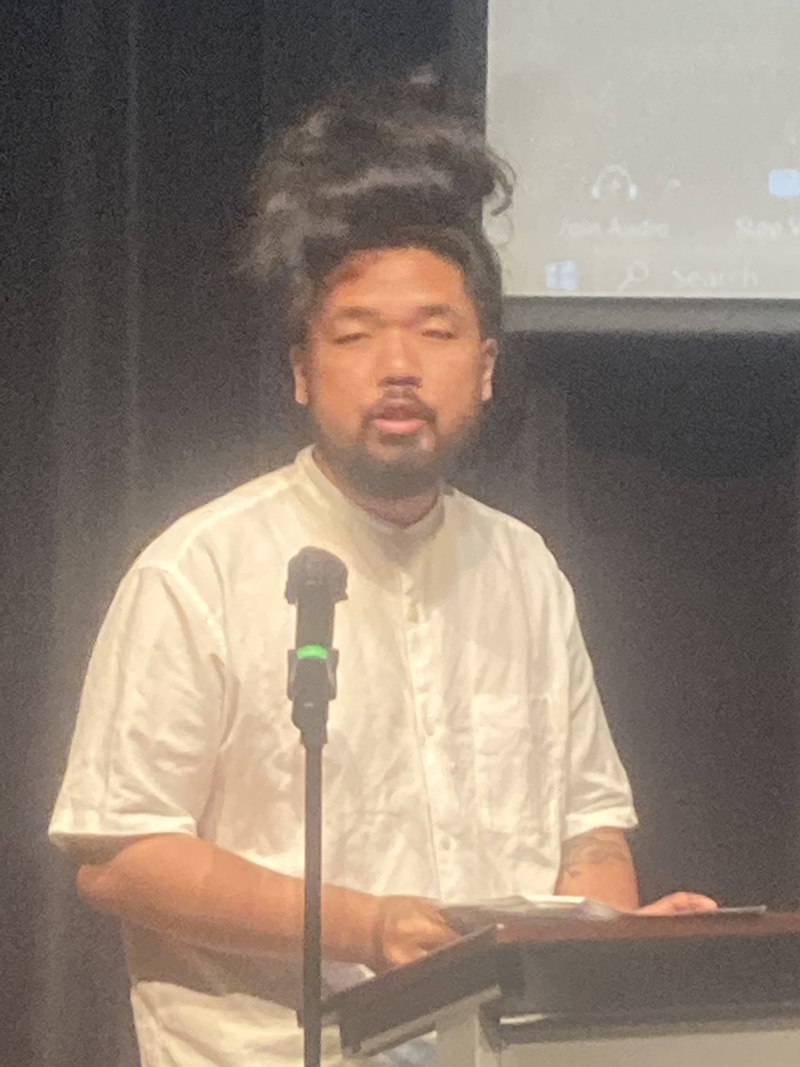By Mahlon Meyer
NORTHWEST ASIAN WEEKLY
The question might have been a litmus test for the type of connection each candidate had with the Seattle Chinatown-International District (CID).
During a candidate forum on Thursday night for the Seattle City Council and King County Council positions that represent the CID, and other marginalized neighborhoods (District 2 and 8), each candidate was asked her favorite restaurant in the community.
The response was telling. For some, it was an opportunity to broadcast her own history of belonging to marginalized groups. For others, it showed an ignorance of the community, or at best, a gaffe brought on by the hectic and disordered pace of the questioning. For still others, it showed deep connections with the community.
Along with the many policy statements and themes stressed by each candidate, the answer almost seemed emblematic of an entire approach to local politics.
The event was the 11th annual A&NHPI Primary Candidate Forum offered at the Wing Luke Museum and co-organized by Asian Counseling and Referral Service, UTOPIA, Wing Luke Museum, ReWA, and Chinese Information and Service Center.
Answers were limited to 30-second or one-minute intervals, so oftentimes candidates had little more than enough time to merely offer sound bites or repeat elements of the question itself.
But the question about a candidate’s favorite restaurant seemed to stand out to the crowd as a marker of the depth of her involvement with the CID—on a personal level.
Tammy J. Morales, who is currently on the Seattle City Council, said because she was Jewish, she went to Ocean City on Christmas.
“It’s a thing,” she said.
Margaret Elisabeth, who repeatedly referred to her identity as a transgender woman and is relatively new to the city, may have misheard the question, due to the raucousness. She mentioned Geraldine’s, “for their French toast”—a restaurant that is in Columbia City. There was an immediate silence for a moment.
Tanya Woo, who grew up in the CID and Beacon Hill, upon hearing the question, had her entire face transform into a smile.
“Only one?” she said. “I guess I’d have to go with Kau Kau—because it’s my father-in-law’s.”
The audience cheered.
Among the two candidates for the King County Council, the contrast was not as stark.
Sofia Aragon, the mayor of Burien, mentioned Tai Tung but said it was “historically” her choice.
Her opponent in the primary is Teresa Mosqueda, who currently sits on the Seattle City Council.
Mosqueda said her favorite place was Hood Famous.
Official versus activist
For most of the two-hour event, candidates wrapped themselves thickly in the symbols and verbiage of their campaigns, hitting virtually the same themes in each of their answers.
In the Seattle City Council race, Morales seemed to start out on the defensive, focusing again and again on her “experience.” It seemed an attempt to draw a distinction between herself and Woo, who as an activist has helped lead movements to protect the CID.
“You deserve a council member who understands how council works,” she said in her opening statement.
Woo, who recently won the endorsement of the Seattle Times, decided to run for elected office after community groups, such as the CID Public Safety Council, failed to obtain funding from the county or the city for community-based programs for the CID.
At the time, Morales said the timeline had passed for any budgetary action. But community activist Betty Lau produced an email she had sent before the deadline. Morales’ staff member said the email had gone in the wrong email box.
“I’ve done all I can do as a civilian,” said Woo.
Woo’s responses to questions about community safety referred at times to her four years of leading a night-time block watch where she has connected unhoused people with services or deescalated crises.
Police accountability
On the issue of police accountability, Woo said the community needed more officers who came from the community, spoke the languages, and could build trust. She also called for more funding for mental health staff and social workers. Civilian oversight of the police was also crucial, she said.
In her own work on the block patrol, she said it was rarely necessary to call the police, except for violent situations.
Morales said the issue of police accountability was “talked about across the country.” On one hand, she said it was necessary to “change the culture” of the police department, which would require “a lot of work.” But on the other, she said reform would simply involve returning to the accountability measures in place in 2017.
“The measures are there. We need to make sure they’re back.”
Gentrification
Morales, in tackling questions about the ills plaguing the CID, often referred to things that the council has already done. For instance, on the issue of gentrification and how it displaces communities of color, Morales said she had helped create the Equitable Development Initiative (EDI)—before she was even on the city council. The Seattle City Council invested $1 million in the fund in 2016. That year, Morales was an organizer working with South Communities Organizing for Racial Equity—the group that advocated for the EDI. Morales was elected in 2019.
She said she had “promoted” a proposal to ensure that there is density in every neighborhood—removing zoning restrictions that enable some exclusive neighborhoods to allow only single-family homes.
Woo conceded development was necessary.
“But we need to be mindful of historical communities, we need to provide hope to those communities.” She added that policies that allow people to retain their homes in marginalized communities are necessary. In addition, in places like the CID, funding and translated materials for upgrading buildings, making them fire and earthquake code safe, are also crucial, she said.

From left: Tammy J. Morales, Tanya Woo, and Margaret Elisabeth as they listen to a question from the moderator (Photo by Mahlon Meyer)
Community concerns
A question about sex workers—and should their trade be decriminalized—seemed to draw attention to a proximity or relative lack thereof to the issue.
Woo, for instance, mentioned going into encampments in the CID to connect unhoused residents with services.
Called first, she instantly said, “Sex workers are also workers.” As with many of her other answers, she returned to the theme of needing to build trust and make sure all voices of the marginalized are heard.
Morales said she had voted for the decriminalization of loitering while sex workers pursued working as prostitutes.
“They’re doing their business,” she said.
On the placement of a Sound Transit station, similar themes were repeated.
Woo said it would be important to listen to voices all along the line, including in Beacon Hill. Her choice would be a placement that was “least harmful.”
Morales seemed to suggest that one of the problems which impeded decision making was that “we don’t have a clear answer from the community.”
She supported the north-south option.
Respecting differences
One question involved disaggregating data to empower native Hawaiians and Pacific Islanders, separating them from Asian Americans—an issue that had become particularly important during the pandemic when their rates of hospitalization and death were found to be significantly higher.
Morales said she had served on the Board of Health for King County and seen how important such changes were.
Woo responded, “We are not a monolith.” But she said even in each group’s struggle to be heard, it was important to stick together for leverage.
“Separate but together,” she said.
A new voice
For her part, Margaret Elisabeth repeatedly raised ideas that were sweeping, but without clear pathways to feasibly achieve them. Her core proposals are raising the minimum wage to $25 an hour, instituting single-payer health care across the city, and curtailing gun sales.
On police accountability, she strongly recommended eliminating qualified immunity for police officers, a vital topic as part of the national conversation, but absent from the specific issues relating to Seattle’s recent decade of the federal consent decree, attempts at reform, and problems creating a fully-empowered civilian oversight board.
King County Council: different approaches
In the King County Council forum, Mosqueda mentioned the word, “funding,” in almost every answer she gave, as if it were a tactic. She spoke in a liquid, impassioned tone that seemed to hold younger audience members on the edges of their seats, so much so that at one point, community activist Gei Chan stood up from the back of the room and roughly chastised the front rows for clapping and snapping their fingers as a distraction and impediment to a fair debate.
Aragon, on the other hand, spoke in a subdued but measured tone, often referring to data.
While Mosqueda, in response to many questions, breezed quickly through accomplishments she named during her time in the Seattle City Council, speaking so quickly it was sometimes hard to follow, Aragon came across as measured and exacting, mentioning facts and statistics for each point.
While one was breathless and enthusiastic, the other was minimalistic and targeted.
Slight differences
On the issue of homelessness, for instance, Mosqueda said the reason she wants a seat on the county council is that it has more control over the issue than any other local government. She mentioned the need to invest in workforce housing, the cost of living, and emergency housing.
Aragon, who was first a nurse and later became an attorney, began her answer by saying that Seattle had the third largest population of the unhoused after New York and San Francisco. She said long-term housing is important and should be funded.
“But there is no emergency housing,” she said.
On police accountability, both said there was a need to develop alternatives to generic police responses to mental health crises.
“We need mental health professionals to support law enforcement,” said Aragon. “Our policies don’t have prevention as part of them.”
Mosqueda said she had funded violence interruption strategies and had spent time with people who had experienced mental health crises.
“They want someone else to respond when it’s a mental health crisis. And officers want the same thing,” she said. “Alternatives need to be found.”
Affordable housing
Each candidate drew upon her experience in office, at times more effectively than at other times.
In answering a question about how to mitigate displacement from gentrification, Aragon described partnerships between her city and the county.
“The county has to partner with local municipalities,” she said. “When you are talking about deeply affordable housing, like 50% of the area median income, the market can’t afford that, you need resources.”
Mosqueda said, as chair of the Finance and Housing Committee in the Seattle City Council, she had overseen “a half a billion dollars” going into affordable housing. She also referred to the JumpStart self-determination fund she had created.
Community questions unasked
Questions from the community were not included in the forums because each session went over time, eliciting vocal disappointment from members of the crowd. It was not immediately clear if the ongoing jokes and repartee with the audience engaged in by the emcee—which at several junctures startled and confused some candidates—contributed to the delays. During a question about whether candidates would support a 7% raise for nonprofit workers, the moderator, Dae Shik Kim, interjected, “My brother is one of them.”
From the start, Kim seemed to downplay the massive community organizing over the past year around opposition to the county’s plan to build a 19th homeless shelter in the CID—which was ultimately successful: the county dropped the plans. Such community uproar merged into intense activism over Sound Transit’s consideration of station placement options in the neighborhood. But Kim seemed either unaware or blasé.
“I’ve been hearing a lot of rhetoric about civic engagement being low,” he said. “It’s great to see such an intergenerational crowd.”
Kim, while an independent contractor for a political consulting agency, worked on strategies for the campaign of Tammy Morales.
Mahlon can be reached at info@nwasianweekly.com.






Wow – clear coverage so quickly! Concise observations and fair balance of reporting comments.